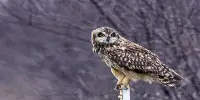Unfortunately for researchers, Australian magpies have banded together to thwart human goals, assisting one another in removing tracking devices. When the researchers implanted the trackers in the birds, they anticipated to learn something about their behavior, but they were pleasantly surprised to witness an unparalleled display of avian generosity. Researchers have been able to implant GPS trackers on creatures that were previously too small to carry them, resulting in an abundance of data regarding animal movements.
This information isn’t simply for the sake of human curiosity; it’s frequently necessary for the survival of endangered species. Nonetheless, it comes with ethical difficulties, as Dr. Dominique Potvin of the University of the Sunshine Coast and co-authors recognize in Australian Field Ornithology.
“Some animals appear to be completely unaffected by the trackers, while others appear to despise them,” Potvin told IFLScience. “It’s impossible to forecast how [a new species] will react.” That’s why we conduct pilot studies.” Small and medium-sized birds are expected to be unable to carry these trackers securely. It would be cruel to load them up with more than they can easily bear, and, as Potvin pointed out, “its lousy science” to treat an animal whose behavior is influenced by the tracker’s weight as representative.
Ornithologists have been unable to place trackers on most members of the passerine family as a result of this. However, Australian magpies (unrelated to magpies in the northern hemisphere) are huge and intelligent passerines who are often mistaken for corvids and should be able to carry trackers unharmed. As a result, researchers decided to equip these Australian symbols with trackers, but with a twist. To avoid needing to capture the birds twice, the researchers created a harness with a quick-release mechanism that causes the trackers to fall off when they come close to a magnet.
The goal was to set up a powerful magnet near a feeding station and then release the capture when the timing was right. The same station also included nearby gadgets that could wirelessly charge batteries and download data, reducing the need for power and data storage. Potvin told IFLScience that the team was very pleased of their innovation, but they hadn’t anticipated Australian magpies’ combination of intelligence, social behavior, and apparent privacy preferences.
The magpies began pecking at the trackers almost as soon as they were released, attempting to dislodge them. This was a difficult feat on their own, but Potvin’s crew saw more magpies arrive to assist, nibbling at the harness until they located a weak spot and liberated their comrades. All five tracked magpies were released within three days, albeit most of the time they were too high up for the researchers to see. Potvin expressed regret to IFLScience that pricey trackers were not recovered as a result of this.
Despite not receiving the data they had hoped for, the team arguably received something far more valuable. Altruism, or assisting someone without expecting anything in return, is nearly non-existent in birds, yet it appears to be the only explanation here. The scientists saw tracker-carrying magpies being released by untracked counterparts, demonstrating that it wasn’t a case of “you remove my backpack, I’ll remove yours.” Instead, some birds appeared to notice that their family members were being upset by something and flew in to assist.














